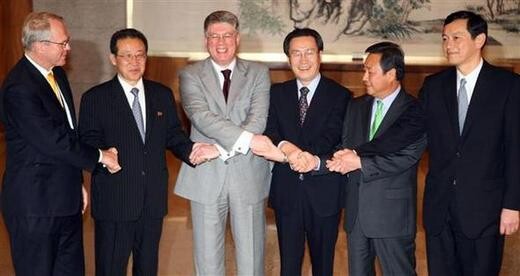hankyoreh
Links to other country sites 다른 나라 사이트 링크
Verification is key in this round of six-party talks

The six-party talks officially reopened at 5:30 p.m. on July 10 in Beijing, China, at the Diaoyutai State Guesthouse. This is the first time talks have been held since October.
In his opening remarks, Chinese Vice Foreign Minister Wu Dawei said that the six-party talks would aim at wrapping up the second phase of the three-step denuclearization process and moving into the third phase of dismantlement.
The six-party talks were revived when North Korea submitted its declaration on June 26, following an improvement in its relations with the United States. Prior to that, the North blew up the cooling tower at its Yongbyon reactor and the United States took steps to remove the North from its list of state sponsors of terrorism and lift economic sanctions.
Christopher Hill, the chief nuclear negotiator for the United States, said that it was necessary to focus on the verification process so as to confirm the completeness and accuracy of North Korea’s official declaration, which was submitted on June 26. Hill said that the verification team would have full access to the related facilities.
One meeting participant reported that North Korea and the United States had agreed to make a system for verification by August 11, when the North’s removal from the terrorism list comes into force.
On the morning the talks began, Hill said, “The devil is always in the details.” He also said that the envoys whill have “a lot of work to do” in this round of talks.
Hill also hinted at the possibility that the delivery method for the fuel oil promised to the North could be altered. When reporters asked Hill whether North Korea was demanding that Japan would provide its share of the energy aid, he said he didn’t believe North Korea would care about which nation provided the fuel. This suggests that the North only wants the six parties to fulfill their promises.
Under an agreement reached in February 2007 by the six parties - South and North Korea, the United States, China, Japan and Russia - North Korea agreed to submit a list of its nuclear programs in exchange for one million tons of heavy fuel oil, or the equivalent, and other diplomatic concessions.
Japan has insisted that it will not provide its portion of the energy aid unless North Korea provides information on Japanese citizens abducted in the 1970s and 1980s.
Hill’s remarks reflect the United States’ desire to verify the declaration, in spite of Japan’s attempts to link the six-party process with the abduction issue.
Please direct questions or comments to [englishhani@hani.co.kr]
Editorial・opinion
![[Column] Park Geun-hye déjà vu in Yoon Suk-yeol [Column] Park Geun-hye déjà vu in Yoon Suk-yeol](https://flexible.img.hani.co.kr/flexible/normal/500/300/imgdb/original/2024/0424/651713945113788.jpg) [Column] Park Geun-hye déjà vu in Yoon Suk-yeol
[Column] Park Geun-hye déjà vu in Yoon Suk-yeol![[Editorial] New weight of N. Korea’s nuclear threats makes dialogue all the more urgent [Editorial] New weight of N. Korea’s nuclear threats makes dialogue all the more urgent](https://flexible.img.hani.co.kr/flexible/normal/500/300/imgdb/original/2024/0424/7317139454662664.jpg) [Editorial] New weight of N. Korea’s nuclear threats makes dialogue all the more urgent
[Editorial] New weight of N. Korea’s nuclear threats makes dialogue all the more urgent- [Guest essay] The real reason Korea’s new right wants to dub Rhee a founding father
- [Column] ‘Choson’: Is it time we start referring to N. Korea in its own terms?
- [Editorial] Japan’s rewriting of history with Korea has gone too far
- [Column] The president’s questionable capacity for dialogue
- [Column] Are chaebol firms just pizza pies for families to divvy up as they please?
- [Column] Has Korea, too, crossed the Rubicon on China?
- [Correspondent’s column] In Japan’s alliance with US, echoes of its past alliances with UK
- [Editorial] Does Yoon think the Korean public is wrong?
Most viewed articles
- 1‘We must say no’: Seoul defense chief on Korean, USFK involvement in hypothetical Taiwan crisis
- 2N. Korean delegation’s trip to Iran shows how Pyongyang is leveraging ties with Moscow
- 3‘Weddingflation’ breaks the bank for Korean couples-to-be
- 4Will NewJeans end up collateral damage in internal feud at K-pop juggernaut Hybe?
- 546% of cases of violence against women in Korea perpetrated by intimate partner, study finds
- 6[Column] Park Geun-hye déjà vu in Yoon Suk-yeol
- 7“Parental care contracts” increasingly common in South Korea
- 8[Column] Yoon’s first 100 days should open our eyes to pitfalls of presidential system
- 9[Interview] Dear Korean men, It’s OK to admit you’re not always strong
- 10[Editorial] New weight of N. Korea’s nuclear threats makes dialogue all the more urgent